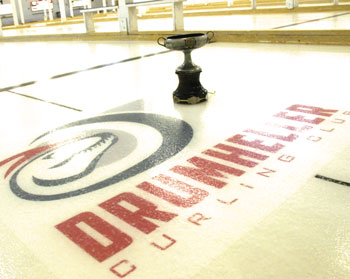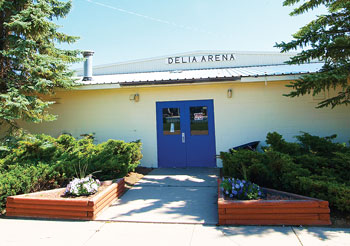 Last weekend 14 teams of women curlers took to the ice in the annual Bonspiel at the Drumheller Curling Club. While this is a tradition that spans generations, the club learned just how far it goes back, and began a new tradition.
Last weekend 14 teams of women curlers took to the ice in the annual Bonspiel at the Drumheller Curling Club. While this is a tradition that spans generations, the club learned just how far it goes back, and began a new tradition.
Kelly Eddy is a dedicated volunteer for the Drumheller Curling Club, and this year at the arena, she stumbled on an interesting piece of Drumheller history.
Collecting dust behind the bar was the “Drumheller Ladies Curling Club Trophy. It is a simple metallic trophy with a turned wooden base. It has a brass colored plaque with the Canadian Bank of Commerce logo, presumably the sponsor of the trophy. On the base are three plaques with winners names dating back to the 1930’s.
Curiosity led Eddy to do a little more research, and she contacted the Canadian Imperial Bank of Commerce (CIBC). She received a response from the company.
Eddy learned the logo was the company’s original emblem.
“In the centre is a caduceus, a mythological symbol often mistakenly used to represent the field of medicine. The caduceus is an ancient Egyptian symbol that is associated with Mercury (Hermes), the god of commerce. The rod represents power, the serpents represent wisdom and the two wings represent diligence and activity,” stated the response from CIBC.
This logo was not used much after World War II leading her to believe the trophy was likely from the 1930’s.
The Drumheller branch of the Canadian Bank of Commerce opened on December 18, 1918, however one of its predecessor banks was doing business from the beginning. The Standard Bank of Canada opened for business in October of 1913. Through mergers, the company became known as the CIBC in 1961.
“This trophy was likely given to the Drumheller Curling Club by the local branch of The Canadian Bank of Commerce. It was common practice for banks to sponsor trophies and prizes at a variety of local sporting events and agricultural fairs,” state the CIBC response about the trophy.
For Eddy this is a treasure and it took about four buffings to get it back into shape.
She wants to learn more about the trophy, and the next clue she is to explore is the four plaques on the base with the names of some of the winners.
One undated plaque has the names Mrs. Rosaine, Mrs. Jamieson, Mrs. Olsen and Mrs. Taylor.
The Hills of Home has an entry for the Rosaine family written by Vera Millar, nee Rosaine. Her father came to the valley in 1917 and started the Central Meat Market with Sid Hopkins. She wrote that her mother was an avid curler and “won many prizes at Bonspiels around the country, and served as President of the Ladies’ club.”
Another plaque from 1932 has the names Mrs. Lawson, Mrs. Henderson, Mrs. Brown and Mrs. Sluggit. A plaque from 1937 has names Mrs. C Burnham, Mrs. D Burnham, Mrs. Clifton and Mrs. Cook.
The Hills of Home offers another possible clue. Mrs. Dora Burnham was the wife of Charles Burnham and they came to the valley in 1919 from Cochrane. One Passage says: “She also spent many a happy hour at the curling rink where she was skip. I remember one of the ladies on her team was Mrs. Dean Lawson. And mother used to refer to her as ‘Dizzy Dean’ and herself an ‘dumb Dora.’”
Eddy would like to learn from residents if they recollect any of the ladies who appear on the trophy.
Rather than leaving the trophy to be a relic, Eddy has revived the award. In the centennial year of Drumheller, they have dubbed the trophy the “Centennial Cup” and was awarded to the winning team at the Annual Ladies Bonspiel.

 In December, the world was rocked by the tragic school shooting in a small Connecticut town. The news reverberated throughout the media and the full ramifications have yet to be seen.
In December, the world was rocked by the tragic school shooting in a small Connecticut town. The news reverberated throughout the media and the full ramifications have yet to be seen. For many, learning to skate is a fundamental part of growing up in Canada. However, the cost of skates can be prohibitive for many families.
For many, learning to skate is a fundamental part of growing up in Canada. However, the cost of skates can be prohibitive for many families.















